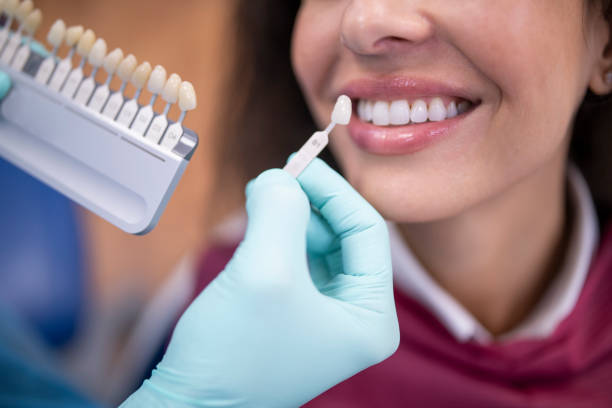A crown is a cap for damaged teeth. It may be made from lots of substances, consisting of steel or porcelain.
You might have a crown over a molar that not often shows, except whilst you yawn widely, or you might have crowns to your front enamel that were particularly designed to shape your different enamel.
Several elements are crucial to not forget when deciding on a crown, inclusive of:
- fee
- power
- sturdiness
A herbal look that doesn’t detract from your smile may also be a priority for you. A dentist can discuss the numerous options and help you to discern what exceptional meets your needs.
Types of dental crowns
Different sorts of materials may be utilized in crowns, which include:
- porcelain
- ceramic
- zirconia
- steel
- composite resin
- a combination of materials
For example, you can have a porcelain crown that’s fused to metallic, as opposed to an all-porcelain crown.
When selecting the fabric for your crown, your dentist will recall elements that include:
- your teeth’s area
- how plenty of the teeth will show when you smile
- position of your gum tissue
- characteristic of the tooth that desires the crown
- how many natural teeth are remaining
- color of the encompassing enamel
You also can communicate with your dentist approximately your private preferences. If you don’t already have a dentist, the Healthline FindCare tool can help you discover one in your area.
Temporary crown
A transient crown is exactly what it seems like. It’s a crown that’ll only remain for your mouth for a quick period.
Your dentist will place it over your tooth with an adhesive that’s without problems, so it won’t be as robust as a permanent crown.
This is performed while you’re anticipating a permanent crown to be made. The everlasting crown might be located on your tooth at a second appointment.
One-day crown
You can get a crown in a single appointment.
Some dental places of work offer same-day crown set up the use of certainly one of several techniques involving pc-aided design/pc-aided production (CAD/CAM).
Your new crown is designed and milled from a block of ceramic proper there inside the workplace.
Onlay or three/four crown
Some crowns only cover a part of the teeth. If you don’t need a complete crown, your dentist would possibly advise an onlay or 3/4 crown alternatively.
Who wishes for a crown?
If you’ve got a huge hollow space that’s too massive for a filling, it may be time for a crown.
You may also want a crown in case your enamel is:
- significantly worn down
- cracked
- weakened
Crowns are also recommended following a root canal on teeth because the tooth is greater fragile and needs safety.
You may be a candidate for a crown if you’re missing a tooth, and the dentist desires to install a dental bridge or a teeth implant.
Dental crown fees
According to the Cleveland Clinic, crowns can range in rate from $800 to $1,500 — or maybe greater — depending on the fabric used in the crown and the scale of the tooth.
A gold crown ought to set you returned pretty a bit greater, possibly as an awful lot as $2,500, in keeping with CostHelper Health.
All-metallic crowns, which are the product of a steel alloy, are on occasion inexpensive than gold or porcelain crowns.
Costs can also upward if the dentist has to carry out more tremendous prep work before putting in the crown. For instance, you could need a root canal or a dental implant, both of which can power the rate up.
Dental insurance may also cover all or part of the value of your crown. However, your plan may additionally cover positive sorts of crowns. Check with your coverage agency to get coverage info.
Talk together with your dentist approximately the sorts of crowns that might be available and appropriate for your dental desires to help decide your dental costs.
Dental crown manner
The technique will depend on whether your dentist opts for a multi-day or same-day technique.
The multi-day system with a transient crown
With a traditional crown, you may want to visit your dentist’s workplace twice.
- The dentist examines and prepares the enamel that desires the crown. This might include taking X-rays of the enamel. They can also take a mold of your teeth or mouth beforehand.
- Your dentist will report down and put off part of the outer layer of the teeth.
- An impression could be fabricated from your trimmed teeth and the encircling tooth.
- The dentist will position a temporary crown over your teeth to shield them.
- They send the impression to a lab that makes the crown. This step might also take several weeks.
- When the crown comes in, you’ll return for the second visit, so your dentist can cement the crown on your tooth.
Same-day process
With a same-day system, you could bypass the transient crown step.
- The dentist takes digital photographs of your mouth.
- Using the digital experiment from the pictures, the dentist creates the crown properly there inside the workplace. You can also need to wait about 1 to 2 hours until the crown is made.
- Once the crown is ready, your dentist cements it into the area. The whole method takes approximately 2 to 4 hours.
You may also be capable of heading again to paintings whilst you’re waiting, depending on your precise scenario.
Not all dentists have the era to make equal-day crowns. Ask your dentist if this feature is available and the estimated price, particularly if you don’t have dental coverage.
Dental crown care
Once the crown is in, it’s essential to take the right care of it. Careful attention to your crown can lengthen its existence.
Here are a few helpful hints:
- Practice careful brushing. If you’re no longer already brushing your teeth two times an afternoon, it’s time to begin. Consider the usage of toothpaste for touchy teeth in case your crown or the tooth around it is touchy to warmness or bloodless.
- Flossing day by day can assist keep all your teeth in tip-pinnacle form.
- Avoid hard meals. Chewing ice or tough foods might cause your crown to crack, especially when you have a porcelain crown.
- If you grind or clench your tooth at night time, your dentist may recommend a nighttime protection to guard your crown and surrounding teeth.
Temporary dental crown care
You’ll want to be particularly mild with a brief crown because the adhesive is best intended for transient installations.
Brush as ordinary but be greater gentle. When you floss, strive to drag the floss out from the aspect of the enamel as opposed to snapping the floss again upward, which could dislodge the crown.
Call your dentist if your transient crown comes off or breaks whilst you’re awaiting the permanent crown. Your dentist can replace it or make a brand-new one for you.
Possible complications of getting a crown
A crown can be a very beneficial strategy for a big problem with one among your enamel. But there are dangers and possible complications that you may experience once you have a crown:
Teeth sensitivity
It’s common for a topped enamel to be sensitive to warmness or cold.
However, if your enamel may be very touchy to stress when you chunk down, the match may be off. Talk together with your dentist about possibly changing the placement of the crown or filing down the pinnacle of the crown.
Chipped crown
Certain sorts of crowns, significantly all-porcelain crowns, are greater vulnerable to chipping. Your dentist may be capable of restoration of small chips.
The porcelain used for porcelain-fused-to-metal crowns can also be away, revealing the metallic structure underneath. These chips may not want to be repaired if the metallic is still intact.
Crown knocked out or free
Your crown could get loose or maybe fall out if there’s no longer enough cement to preserve it in place. Call your dentist in case you suppose your crown feels loose or wiggly.
Allergic reaction
It’s not commonplace, however, some humans will have an allergic reaction to the steel used in a few crowns.
Gum disorder
If you word the gums around your crown getting sore or indignant, or if this region begins bleeding, you will be growing gingivitis or gum sickness.
How long do dental crowns remain?
The lifespan of a crown can range between 5 and 15 years. Some crowns are sturdier than others, so they may close longer. subjected three exclusive forms of monolithic crowns to “high chunk forces” and found that monolithic zirconia crowns had been the least likely to split or crack.
A monolithic crown is a crown made from a strong piece of fabric, including zirconia.
However, researchers used fashions for his or her experiments. They additionally warned that versions in crown placement and different elements could affect the effects on an actual individual.
As a well-known rule, gold crowns and porcelain-fused-to-metallic crowns tend to close the longest.
All-ceramic and all-porcelain crowns might also appear greater natural, however, they’re typically no longer as robust as the metal or porcelain-fused-to-metallic versions. All-resin crowns generally tend to wear down faster, too.
When looked after, crowns can last a few years.
Alternative to a dental crown
Your dentist will most in all likelihood propose the crown that works quality for your precise state of affairs or is the satisfactory alternative option.
For example, your tooth may be too weakened or worn down to guide an ordinary filling, so veneer, whether it’s the front enamel or every other sort of remedy is usually recommended.
Or, your enamel may have a cavity that’s too huge for a filling, and your dentist recommends crowns because the pleasant alternative remedy choice to guard the enamel.


